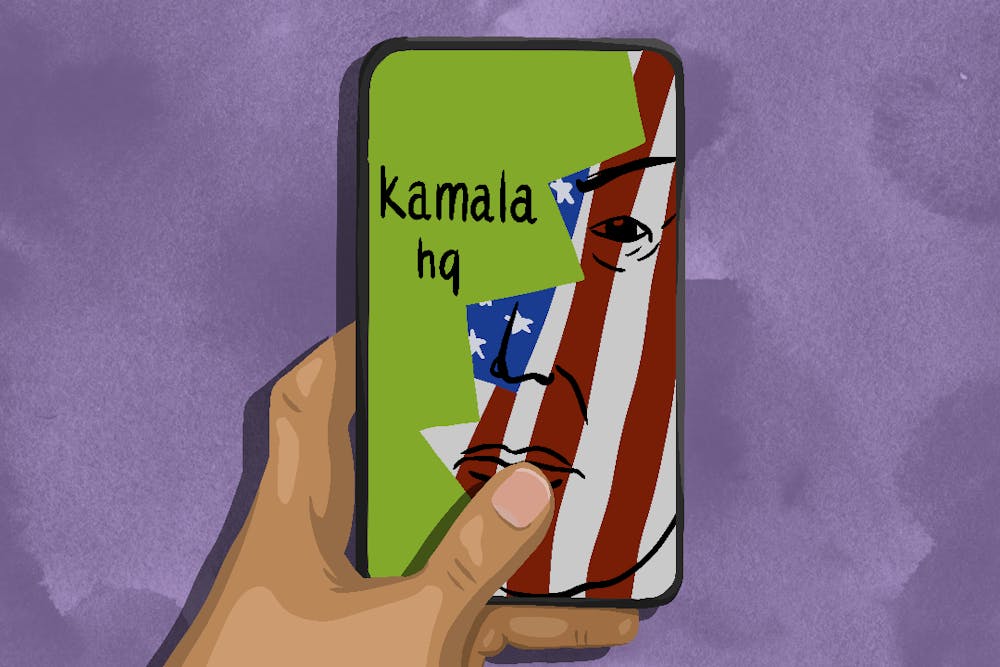Donald Trump racked up 3 million followers on TikTok in roughly one day. Feeds are flooded with Kamala Harris "Brat" Memes. Campaigns are pouring funds into TikTok campaigns.
Over the past few months, social media has hit presidential campaigns and headlines like these by storm. As many members of Generation Z are now first-time voters, election campaigns have evolved to cater to this new audience, often through TikTok, Instagram or other online platforms.
For Allyson Ritter, a sophomore studying marketing, election campaigning has become much more noticeable and personal now that she can vote. She said political advertisements were under nearly all the YouTube videos she has come across recently, even if the videos themselves were not political, and that both parties tended to aggressively campaign against the other.
"When I watch a Democratic Party campaign that's bashing the Republican Party, it's usually that they're bashing their policies," Ritter said. "I feel like the Republican Party goes a lot more with bashing the other candidate."
On the other hand, Carson Carpenter, a senior studying political science and the president of College Republicans at ASU, said the Republican Party uses its campaigning for policy recommendations.
"Democrats (are) more highlighting social issues and stuff that’ll affect you emotionally; and looking at it through a psychology lens, that’s very effective, but it’s not very effective at pronouncing an agenda for a future administration," Carpenter said.
READ MORE: Voters attend the Harris-Walz rally in AZ, share insight into Gen Z's role this election
Conflicting experiences with advertisements like this may be a result of the heavy emphasis on social media campaigning this election cycle.
Allie Kruk, a senior studying marketing, said that advertising has expanded across platforms because "we're in such a consumer-subject world and social media-focused world."
Social media algorithms, she explained, allow people to curate their feeds to what they want to see, particularly with election content and advertisements, but Kruk and Ritter said this can be a positive thing.
"Social media has become a huge part of where people get their news because conventional news media has just gotten so far away from it," Carpenter said. "Because now for conventional media, you have to buy a subscription."
This can be particularly impactful for first-time Gen Z voters who may not have platforms outside of social media or the means to pay for a news service.
As a result, political nominees have started leaning into social media and online trends. Carpenter and Kruk both recalled seeing influencers talking to candidates or attending national conventions. Carpenter noted a fine balance between campaigning for "hype" and campaigning to spread information.
"Memes or TikTok trends (are used) to really get people involved in elections and campaigns," Ritter explained, contrasting this kind of advertising with campaigns that focus on hard work and serving families, which may not target a younger audience.
For example, the Democratic National Convention hosted influencers and has embraced memes based on Charli XCX's album "Brat" as well as candidate Kamala Harris' statement on coconut trees.
"They're playing more into relatability and fitting in with the populations that have the biggest voices, and just trying to be a candidate for all," Kruk said.
Carpenter also added that the College Republicans at ASU have been using social media to grow awareness and interest in the organization. While the campus group's strategies and infrastructure with advertising are fairly constant, national campaigning is always evolving.
"I think a lot of campaigns are wanting to get people that are low propensity voters to come out and support their campaigns," Carpenter said. "We take people that are initially interested in politics, and give them a pathway that they can implement in their career fields, where a lot of normal campaigns nationwide will try to target people that aren't interested at all."
Kruk and Carpenter said that Gen Z is more involved in politics than ever, and a lot of that is rooted in social media.
Ritter, speaking on social media's influence on Gen-Z, said "Gen-Z can be so unserious sometimes that I'm like, 'Oh, well it's actually an important election.' Especially since Arizona can swing right or left at this point, it's even more important (here)."
According to Carpenter, Gen Z plays an important role in this year's presidential race, taking part in high-energy rallies, calling people to vote and participating in the political process.
"I think that a lot of younger Gen Z people want to insert themselves in that," Carpenter said. "Courage is contagious."
Edited by Alysa Horton, Sophia Braccio and Natalia Jarrett.
Reach the reporter at pkfung@asu.edu.
Like The State Press on Facebook and follow @statepress on X.
Pippa is a sophomore studying journalism and mass communication with minors in political science and German. This is her third semester with The State Press. She has also worked at Blaze Radio and the Los Alamos National Lab.




